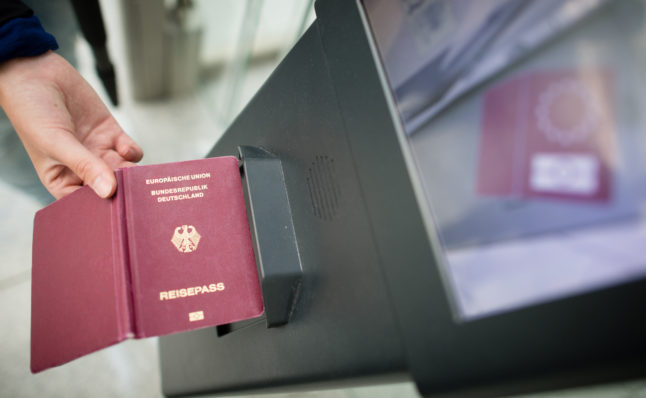The EU’s new entry and exit system (EES) is due to come into effect in May 2023, followed by the new ETIAS system in November, and between them they will have a major effect on travel in and out of the EU and Schengen zone.
EES means automated passport scans at EU external borders, which will increase security and tighten up controls of the 90-day rule.
But the system is aimed at tourists and those making short visits to Germany – not non-EU citizens who live in Germany with a visa or permanent residency card – and there had been questions around how those groups would use the new system.
READ ALSO: EXPLAINED: What the EU’s new EES system means for travel to Germany
The European Commission has now confirmed that EES does not apply for non-EU citizens who are living in Germany, telling The Local: “Non-EU nationals holders of residence permits are not in the scope of the Entry/Exit System and ETIAS. More about exceptions can be found on the website.
“When crossing the borders, holders of EU residence permits should be able to present to the border authorities their valid travel documents and residence permits.”
What this means in practice is that foreigners living in Germany cannot use the new automated passport gates that will be introduced with EES in May 2023.
The reason for this is that the automated passport gates only give the option to show a passport – it is not possible to also show a residence permit or permanent residency card.
The automated system also counts how long people have stayed in Germany or Schengen, and whether they have exceeded their 90-day limit for short-term or visa-free stays.
Since residents are naturally exempt from the 90-day rule, they need to avoid the 90-day ‘clock’ beginning when they enter the EU. The best way to do this is to ensure that someone sees sees your residence permit upon entry.
According to German immigration authorities, a stamp given out in error should not have an impact on residency rights. However, if the entry checks are conducted electronically, your passport could erroneously record an overstay, which could cause headaches later on.
READ ALSO: British residents of EU told not to worry about ‘souvenir’ passport stamps
A Commission spokesman said: “EES is an automated IT system for registering non-EU nationals travelling for a short stay, each time they cross the external borders of European countries using the system (exemptions apply, see FAQ section).
“This concerns travellers who require a short-stay visa and those who do not need a visa. Refusals of entry are also recorded in the system. Non-EU citizens residing in the EU are not in the scope of the EES and will not be subject to pre-enrollment of data in the EES via self-service systems. The use of automation remains under the responsibility of the Member States and its availability in border crossing points is not mandatory.”
According to the French Interior Ministry, residents from non-EU countries should go to a manned gate and present their passport and residency papers together, instead of using the electronic gates.
The Local has contacted the German Interior Ministry to confirm whether similar guidance applies in Germany.





 Please whitelist us to continue reading.
Please whitelist us to continue reading.
So tourists have more privileges over long-term residents, who have to stand in the immigration queue for possibly hours?